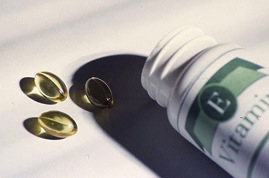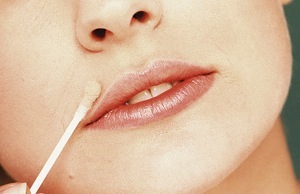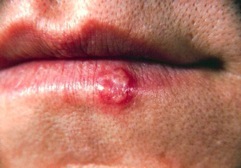-
Dental & Mouth Concerns









Mouth Sores
Signs, Symptoms & Causes
For Canker Sores
-
•Small, round, red-rimmed sores with white or gray centers are in the lining of the mouth or on the tongue, gums, or lips.
-
•Discomfort occurs with eating and talking.
-
•A burning or tingling feeling can be present.
Canker sores may be caused by any tear in the mouth’s lining. This can be due to an uneven tooth, rough tooth brushing, dental work, a burn from a hot drink or food, etc. A lack of vitamins and minerals, emotional stress, and having a history of canker sores can trigger them. The sores usually resolve in 4 to 14 days.
For Cold Sores
-
•A tingling feeling is on or near the lips for 2 days before one or more sores appear.
-
•Small, red blisters filled with clear fluid rupture and weep. Scabs form.
Cold sores (fever blisters) are caused by the herpes simplex virus (HSV), either HSV-1 (this is most often the cause) or HSV-2 (the usual cause of genital herpes). This virus lies dormant in the body and can return. A fever, a cold, stress, cold or windy weather, and strong sun exposure are triggers for outbreaks. Cold sores are contagious, especially when the blisters rupture and weep.
Cold sore on lower lip.
For Thrush
-
•The tongue looks red. The insides of the mouth have creamy white patches. A white coating can be seen inside the mouth and the throat.
-
•If the throat is affected, it hurts to swallow.
Thrush is caused by a fungal infection. Often it occurs after the recent use of antibiotics or corticosteroids.
Treatment
Canker sores heal within 2 weeks. Self-care can help with symptoms and speed up healing. If needed, a mouthwash with tetracycline and/or an oral paste (amelxanox) can be prescribed.
Cold sores are treated with self-care measures and antiviral medications, such as acyclovir and penciclovir.
Thrush is treated with prescribed, oral antifungal medicines.















Self-Care / Prevention
To Treat Canker Sores
-
•Mix 1/2 teaspoon salt in 1 cup of warm water. Rinse the mouth with an ounce of this mixture 4 times a day. Don’t swallow the water.
-
•Put ice on the canker sore. Suck on a frozen popsicle.
-
•Avoid spicy foods and acidic drinks like citrus juices.
-
•Use over-the-counter products, like Anbesol, Blistex, and aloe vera gel.
-
•Swish Mylanta or milk of magnesia around the mouth to coat the sore. Then spit the medicine out.
-
•Take an over-the-counter pain medicine as directed.
Put the gel from a vitamin E capsule on the sore several times a day.
To Help Prevent Canker Sores
-
•Avoid things that injure or irritate the mouth, such as hot drinks and sharp objects.
-
•Use a toothbrush with soft bristles. Use a toothpaste without sodium lauryl sulfate. Don’t brush too hard.
-
•Take vitamins and minerals, as advised by your doctor.

To Treat Cold Sores
-
•Apply antiviral medication, if prescribed. Or, use an over-the-counter treatment (e.g., Abreva antiviral cream, Campho-Phenique, Blistex) on the affected area at the first sign of a cold sore. You can also gently dab aloe vera or petroleum jelly on the sore.
-
•Apply ice to the sore. Suck on a frozen popsicle.
-
•Take an over-the-counter medicine for pain as directed.
-
•Deal with stress. (See Manage Stress.)
-
•Avoid sour, spicy, or acidic foods. These may irritate the sores.
Use a cotton swab to apply aloe vera, etc. to the affected area.
-
•Take vitamin C and/or zinc supplements, as advised by your doctor.
-
•Apply cool compresses when the sores have crusted over.
To Avoid Getting or Spreading Cold Sores
-
•Use medicines, as prescribed by your doctor.
-
•Don’t share drinking glasses, towels, or cooking utensils.
-
•Avoid direct skin contact with the sores.
-
•Don’t touch cold sores with your fingers. If you do touch the cold sores, do not touch your eyes. This could cause a serious eye infection.
-
•Try to figure out and then avoid things that trigger cold sores.
-
•When you are in the sun, wear a hat and use a sunblock with a sunprotective factor (SPF) of 15 or more on the lips.
-
•Use a lip balm on cold or windy days.
Oral Cancer Warning Signs
-
•Red and/or white patches inside the mouth or on the lip.
-
•A sore on the lip or in the mouth that won’t heal.
-
•A lump in the neck.
-
•Bleeding in the mouth.
-
•A hard time swallowing or it feels like something is caught in the throat.
-
•Loose teeth or a hard time wearing dentures. See a doctor or dentist if you have any of these signs for 2 weeks or longer. Any of these signs may be caused by oral cancer or by other, less serious problems. Don’t wait for something to hurt. Pain is not usually an early symptom of oral cancer.
Does a child have redness or sores in the mouth that make it hard for him or her to eat and does the child have a fever that needs immediate care for his or her age?
Do mouth sores not respond to prescribed treatment or self-care?
After a mouth injury or tongue or lip piercing, are any of these signs present?
-
•Increasing pain, redness, swelling, or tenderness around the wound or piercing site.
-
•Swollen glands in the neck or jaw area.
-
•Pus drains from the wound site.
-
•Temperature of 100ºF (37.8ºC) or higher.
-
•Overall ill feeling.
Do cold sores last longer than 2 weeks, appear more than 4 times a year, or occur after starting a new medicine?
Do you have signs and symptoms of thrush listed above?
With a cold sore, do you have any of these problems?
-
•Eye pain or the eye feels irritated.
-
•Severe headache.
-
•A fever and general achy feeling.
-
•Blisters in the genital area.
-
•The cold sore makes it hard to swallow, talk, or eat.
Questions to Ask
With sores or redness with white patches in the mouth, are any of these conditions present?
-
•HIV/AIDS.
-
•The person is on chemotherapy.
-
•Recent organ transplant.
-
•Diabetes.
-
•The person has been taking corticosteroids.






Copyright © 2009, American Institute for Preventive Medicine. All rights reserved.
Get more information from:
HealthyLearn® | www.HealthyLearn.com. Click on MedlinePlus®.
American Dental Association | www.ada.org

